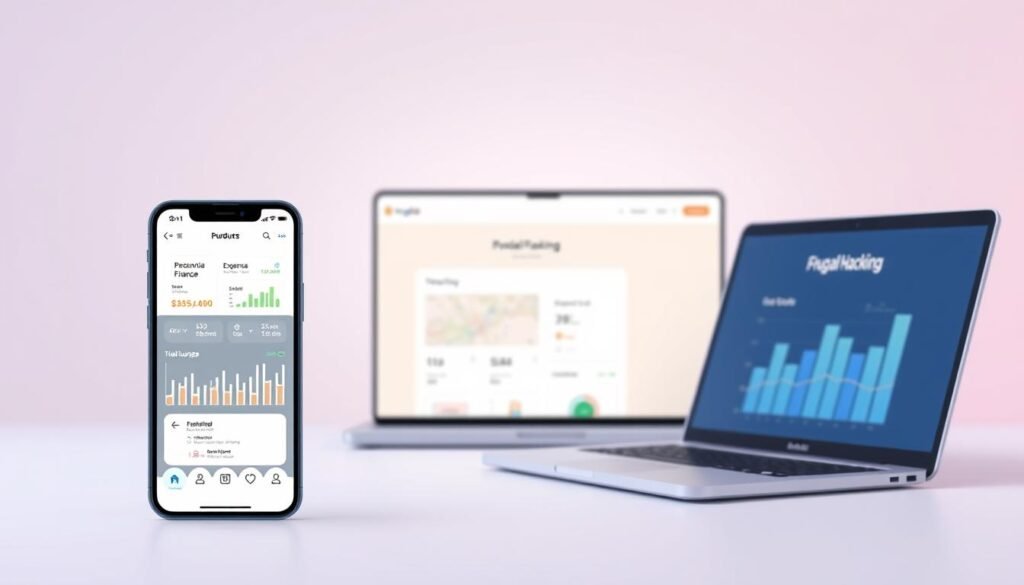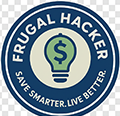Have you ever felt your paycheck vanishing incredibly fast? It’s like magic, but not the fun kind. Suddenly, your money’s gone into bills, groceries, and those late-night online buys. We’ve all been there. But, imagine there’s a way to keep your cash from disappearing.
Budgeting might sound less exciting than a magic trick, but it’s truly amazing. Imagine you’re a circus artist walking on a tightrope. That’s your budget. With some skill and effort, you stay balanced. We’re here to be your safety net.
Let’s explore some frugal hacks that make saving money both easy and a bit of a laugh. Truth is, we often miss out on unnecessary expenses. We’ll teach you to tighten your budget and find treasures in thrift shops. Together, we’ll turn your spending mishaps into victories. Ready for this money-saving adventure? Let’s dive in!
Key Takeaways
- Effective budgeting can turn your financial woes into wins.
- Save money by mastering simple frugal hacks.
- Track your spending to stop money disappearing mysteriously.
- Embrace a frugal lifestyle for lasting financial benefits.
- Thrift shopping and other hacks can make saving fun.
Creating a Sustainable Budget That Works for You
Budget planning is like an exciting adventure where every dollar counts. It sounds boring, but it doesn’t have to make you sad. We’ll show you how to budget step by step.
Understanding Your Expenses
Let’s find out where your money is going. It might be the coffee shop visits or forgotten subscriptions. Knowing what you spend is crucial. So, track every dime for a month. You might find surprises!
Setting Realistic Saving Goals
You know where your money goes. Now it’s time for savings goals. Make sure they are realistic. Dreaming of a vacation? Start small. Don’t expect a trip to Europe on a tight budget.
Tracking Your Spending
Keeping track of spending is key. Use a spreadsheet, a notebook, or a budget app. This helps you see where your money really goes. It’s like a financial scoreboard.
Here’s a tool for tracking expenses:
| Expense Category | Monthly Budget | Actual Spending | Difference |
|---|---|---|---|
| Housing | $1000 | $950 | $50 |
| Food | $300 | $320 | -$20 |
| Transportation | $150 | $130 | $20 |
| Entertainment | $100 | $120 | -$20 |
| Miscellaneous | $50 | $60 | -$10 |
Good budgeting is not about being perfect right away. It’s about checking and adjusting your finances. This way, you stay financially healthy without missing out on fun things.
The Power of Secondhand Shopping
Why pay full price for new items when secondhand shopping offers so much? Thrift stores are magical places. You can find great deals and help the planet too. Your bank account and the earth will be grateful!
Benefits of Buying Used
Saving money is a big plus with secondhand shopping. Designer looks become affordable. And there’s more good news:
- Environmentally Friendly: You’re giving items a second chance and reducing waste.
- Unique Finds: You can discover unique vintage and quirky items.
- Quality: Many older items were made to last longer than today’s fast fashion.
Where to Find the Best Deals
Want to find the best deals? Here are some great places to start:
- Local Thrift Stores: Try Goodwill, Salvation Army, or local charity shops for sustainable shopping.
- Consignment Shops: These stores have gently used, higher-end items at great prices.
- Online Marketplaces: Sites like eBay, Poshmark, and Facebook Marketplace offer easy access to thrift finds.
- Garage Sales and Flea Markets: With some patience, you can find amazing deals. Haggling adds to the fun!
| Shopping Venue | Pros | Cons |
|---|---|---|
| Local Thrift Stores | Great prices, unique finds, supporting local causes | Stock varies, condition can vary |
| Consignment Shops | Higher quality items, curated selection | Higher prices than thrift stores, limited inventory |
| Online Marketplaces | Convenience, broad selection, user reviews | Shipping costs, can’t inspect items in person |
| Garage Sales/Flea Markets | Bargain prices, ability to negotiate, eclectic finds | Time-consuming, condition can be unpredictable |
Meal Prep to Reduce Grocery Bills
Think about cutting your grocery costs while still eating great. Meal prep means planning ahead and becoming best friends with your wallet. Bulk buying isn’t just hoarding food; it changes your pantry into a money-saving zone. Freezing turns your meals into treasures that fill both your belly and savings.
Planning your meals
Meal prep begins with making a plan. Start by choosing your favorite recipes and creating a list. It solves the “What’s for dinner?” dilemma before it even starts.
Buying in bulk
Ever get excited over a big sale on rice? Bulk buying saves money by lowering costs on each item. Fill your pantry with staples like grains and beans, making it apocalypse-ready.
Storing and freezing meals
Now onto freezing, not the cold kind, but meal storage. Prepping and freezing meals is smart—it saves both time and money. Get some reliable containers and bags for the freezer. Imagine having a stash of easy meals, making you the chef of your kitchen.
Leveraging Rewards Programs, Discounts, and Cashback Offers
Have you ever thought your wallet was taking advantage of you? It’s time to turn things around and make your money work for you. Rewards programs, credit card bonuses, and cashback offers are not just buzzwords. They’re ways to make your money stretch further.
Maximizing credit card rewards
It opens the door to great perks. By using credit card rewards, you earn points, miles, and cashback on daily buys. Everyone likes getting “free money,” right? There’s a tip for you – Chase Sapphire Preferred and American Express Gold are top choices. They offer travel points, dining rewards, and more.
- Travel enthusiasts: Use those flight miles wisely.
- Foodies: Get cashback on dining out.
- Shopaholics: Gain rewards for updating your closet.
Joining loyalty programs
Loyalty programs aren’t just for avoiding extra charges on coffee. They benefit you at various places, not just cafes. Big retailers like Target and supermarkets like Kroger offer rewarding loyalty programs. The secret? Stay loyal to your chosen brands to see your rewards grow.
| Store | Benefits | Best For |
|---|---|---|
| Target Circle | Exclusive discounts, free shipping | Frequent Shoppers |
| Starbucks Rewards | Free drinks, birthday rewards | Daily Coffee Drinkers |
| Kroger Plus | Fuel points, grocery discounts | Weekly Groceries |
Getting into rewards programs and cashback deals is simple. It just needs some planning and being consistent. Suddenly, you’ve stepped up your savings game. Getting smart with finances can actually be quite fun!
Using Budgeting Apps to Simplify Financial Management
Let’s be honest. Handling money can be as tricky as performing circus tricks. But hey, technology is here to help. There’s a bunch of budgeting apps waiting to make life easier. Picture this: a reliable helper that doesn’t cost as much as a real-life financial advisor. Sounds good, doesn’t it? We’ll look at some top apps to streamline your financial management.

Top Budgeting Apps to Consider
We’ve got the best of the best budgeting apps here to make you a money managing hero:
- Mint: Connects all your accounts in one spot. It sorts your spending into categories automatically. Impressive, right?
- YNAB (You Need a Budget): Ideal for serious budgeters. It bases your budget on what you earn, steering clear of past spending.
- PocketGuard: True to its name, it keeps your cash safe. Shows what’s left after bills and savings.
How to Use Apps to Track Expenses
Let’s talk about using budgeting apps as your personal spending tracker. Start by linking your bank account and cards to the app. Forget about typing in every small purchase. The app tracks your spending and organizes it. Make it a habit to check the app daily. It’s like a money mindfulness practice. You’ll spot strange fees, see spending habits, and fix your budget. Just like that, you’re managing money like a champ!

Negotiation Skills to Lower Bills and Save Money
Finding a $20 bill in your jeans is great. But not having to pay an extra $20 is even better. We’re going to talk about negotiation skills. These skills can help you save on utilities. They can make service contracts scared. Do you want to become a negotiation master and cut your bills? Let’s start!
Negotiating Utility Bills
Utility bills like electricity, water, or internet can be shocking. But there’s hope. You can use negotiation skills to lower those bills. First, look at your past bills for any mistakes or high charges. Then, call the company, explain your situation, and ask for a lower rate. It often works if you keep trying and stay polite.
Don’t forget to ask for discounts or special programs. Every saved dollar counts!
Negotiating Service Contracts
Service contracts can feel like traps. But your negotiation skills can set you free. This includes deals on cable, internet, or gym memberships. A simple “I might cancel” can make companies offer better deals. They don’t want to lose you.
Do your homework on what others are paying. Don’t take the first offer. You’ll be amazed at how much you can save. It’s about keeping more money in your pocket!
Frugal Hacking: Small Daily Habits Add Up
Ever wondered how daily savings tips turn into real cash? It’s like being Sherlock Holmes of saving, eyeing every dime. You’re on a quest, switching off lights with zeal, as if each bulb costs rent.
Unplugging a device earns you an invisible award for best money-saving moves. It’s the small, daily habits that truly add up. Once you see small wins, like a lower electricity bill, you’ll know you’re doing something great.
Let’s dive into some examples to start:
| Habit | Immediate Effort | Monthly Savings |
|---|---|---|
| Turning off lights | 5 seconds | $10 |
| Unplug devices | 10 seconds | $12 |
| DIY coffee | 3 minutes | $40 |
| Prep meals | 1 hour | $80 |
This is like finding hidden treasure, but the treasure is keeping money in your pocket. Let’s build those saving skills with small, daily steps. Because every small effort matters, and adds up to big savings.
Smart Spending Tips Essential for Financial Freedom
Alright, folks, it’s time to jump into the galaxy of smart spending. You’re going to outsmart your wallet and still have tons of fun. Let’s be real, achieving financial freedom doesn’t mean cutting all your expenses. It’s all about the choices that benefit you now and in the future. It’s like choosing the best Avengers movie to watch again: quality matters more than quantity.
Here’s something to think about: buying things that last longer can save you money over time. It’s better than always buying cheap stuff that breaks. Yes, we all want things now, like an extra slice of pizza. But, ask yourself if it’s really worth it in the long run.
Being smart with money means getting good at budgeting strategies. Start by keeping track of all expenses. Yes, that includes the fancy coffee you treat yourself to. Knowing where your money goes is the first step. Making a budget doesn’t trap you into not spending. It’s about setting goals so your money is ready for fun times.
Think of your budget like your favorite social media feed. It’s carefully picked, shows your goals, and makes you happy. Review it often to stay on track. This way, you’re always focused on what matters for your financial freedom.
Master these budgeting strategies, and you’ll handle money like a pro. You don’t have to give up the joys of life. Here’s to making your money work for you!
Reducing Costs through DIY and Repairs
Have you ever fixed something at home and wished you started sooner? Doing DIY not only cuts costs. It also makes you feel proud when you succeed. Skip the costly pros. By tackling projects yourself, you save cash and learn new skills.
Simple Home Repairs
Dealing with a leaky tap or a toilet that won’t stop running? No need for a professional. Just grab a wrench and plumber’s tape. You can fix them quickly (watch YouTube to learn how). These small repairs can save you a lot of money over time.
DIY Projects to Save Money
Let’s focus on DIY projects that keep more money in your pocket. Why not build a garden bench or refurbish an old dresser? A bit of paint and effort can transform something old into something stunning. And the best part? You get to enjoy your creation without breaking the bank.
Effective Financial Planning for Long-Term Savings
Let’s get straight to the point. We’re here to make financial planning easy and fun, ensuring you’re set for the future. Imagine yourself enjoying life without money worries because you’ve saved wisely.
Firstly, think of saving as a fun game, not a hard task. Look into investments that could impress even Warren Buffet. The stock market is not as scary as it seems. Spread your investments to minimize risks. Mutual funds, ETFs, and bonds should be on your radar.
Now, let’s talk about saving for the long haul. It’s time to think bigger than just saving for a trip. Consider starting an IRA or increasing your 401(k) contributions. Compound interest will be your best ally in achieving financial independence.
Also, boosting your emergency fund is smart. It comes in handy for unexpected bills and adds to your peace of mind. Try to save up six months’ worth of expenses. This way, you’re well-prepared for anything.
Yes, financial planning can be challenging, but the rewards are worth it. With savvy investment choices and a focus on the future, you’ll build a secure financial foundation. Now, what’s your next step towards wealth?
Embracing a Frugal Lifestyle for Lasting Benefits
Welcome to the amazing world of saving, where making the most of our resources is key. This is the great game of *Life*, but here, saving money is the win—not buying the priciest properties. It’s about enjoying life without spending too much.
Mindset shifts towards frugality
Changing to a frugal lifestyle starts with a new way of thinking. Imagine switching from regular soda to seltzer. It might be hard at first, but it ends up being refreshing. Start believing that less is more. This doesn’t mean you should be too cheap. Rather, become a wise shopper who gets the most out of every dollar.
When you’re careful with money, each buy is a smart choice. This leads to living in a more eco-friendly way, all because of your smart choices.
Incorporating frugality into daily routines
Let’s add some saving tricks into your day. Why not make your own coffee instead of buying it? Then, think carefully about whether you really need something before you buy it. It’s like being a ninja in the mall—quick and smart, avoiding extra buys.
Check out this table for simple saving habits:
| Habit | Impact |
|---|---|
| Using public transport | Saves on fuel and car maintenance |
| Meal prepping | Reduces grocery bills and food waste |
| DIY home repairs | Minimizes service costs |
| Using energy-efficient appliances | Lower electricity bills |
With these habits, you’re not just saving money. You’re also making your lifestyle more eco-friendly. A bigger savings account and a healthier planet—sounds good, right? So, it’s time to make each penny work hard. Living frugally is all about improving your life and saving. And it’s easier than you might think.
Thrift Shopping: More Than Just Clothing
Think thrift shops only have old clothes and odd cups? Think again! They offer a world of opportunities for smart buyers. You can find hidden treasures and learn the secret rules of finding great deals. Yet, be careful—some bargains might not be as good as they seem. This guide will help you explore thrift shops like an expert.
Finding treasures in thrift stores
Thrifting is like a big adventure, searching for treasure. You might find rare vinyl records or well-kept designer outfits. One of the top reasons to go thrift shopping is finding one-of-a-kind items you can’t get elsewhere. Plus, it feels amazing to buy the perfect item for much less than its original cost.
Stores like Goodwill and The Salvation Army are full of surprises. But you need patience. Look carefully through the racks and don’t ignore the lower shelves. That’s where you might find the best items, often overlooked.
Pros and cons of thrift shopping
Thrift shopping isn’t perfect. Yes, it saves a lot of money, which everyone loves. However, it has its challenges.
| Pros | Cons |
|---|---|
| Eco-friendly option | Time-consuming |
| Unique finds | Might be disorganized |
| Cost-effective | Items might need cleaning or fixing |
Even with these challenges, the benefits of thrift shopping make it worth it for those who love the chase. It’s not just saving money; it’s also about reusing and repurposing items.
If you’re new to thrifting or already love it, keep these pointers in mind. Enjoy your search, and may luck be on your side!
Money Saving Tips
Prepare for a bunch of tips and tricks to save money. We’re sharing secrets on how to spend less without missing out on fun. Learn everyday hacks that turn saving into a smart game. With our advice, you can automate savings and become a stylish eco-warrior, improving your money situation.
Practical Tips to Cut Down Expenses
Seeing your bank statement shouldn’t scare you. Why not brew your own coffee instead of buying it every day? This can save lots of money. Plus, you get to try being a barista at home.
Subscriptions can trick you. A quick check can reveal ones you don’t use. Cancel those to save cash. Choosing generic brands over expensive ones also saves money without losing quality. It’s about being smart with your choices.
Everyday Hacks to Save More
Saving every day is simpler than you think. First, auto-transfer money to savings when you get paid. It feels like you’re saving effortlessly. Second, get creative with what you have. Refresh old furniture or find your next project at thrift shops.
Finally, try a ‘no-spend’ day once a month. Seriously, spend nothing for one day. It’s surprisingly freeing and helps your budget.
| Expense Category | Traditional Approach | Frugal Hack |
|---|---|---|
| Coffee | Daily Starbucks Runs | Home Brewing |
| Subscriptions | Multiple Services | Cancel Unused Ones |
| Groceries | Name Brands | Generic Brands |
| Furniture | Buying New | Upcycling |
Conclusion
Well, look at you! You’ve mastered the ultimate guide to saving money. You now have smart money-saving strategies and know how to budget. You did this without finding it boring. It’s time to use what you’ve learned every day.
Saving money is all about using your knowledge wisely. By buying secondhand, cooking at home, using rewards, and using budget apps, you’ll manage money better. You might even find it fun! Your budget is now your best pal in managing expenses.
Now, use your skills to improve your finances. Keep up with good money habits and budgeting. Watch your savings grow. You’re just starting to live well on a budget. This journey lets you reach your financial goals and have fun too (like making your own coffee). Cheers!




